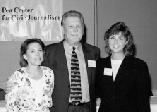Spring 1998
Democracy in Action:Political Newcomers Take Back Bradenton
By Wayne Poston
The summer of 1996. A mid-sized community on the west coast of Florida. A strong mayor and his city council are on the verge of signing a contract to build a new city hall-fire-police complex on prime waterfront land. Business as usual? The Bradenton Herald, the local newspaper, had no particular interest in where the facility would be built, but it did recognize that the decision had had no public discussion. Acting on journalism reflexes strengthened by previous public journalism projects, the editors and writers gathered to discuss civic journalism and various possibilities for the story. It hired a polling firm to survey city residents on whether they thought it was a good idea. And the newspaper published a coupon asking people to write their thoughts on the plan. After The Herald’s quickly mounted and aggressive reporting on the route the decision had taken and the results of the poll (which was turned around in 10 days), plus an editorial urging more public discussion for such a critical community decision, citizens involved themselves in the process. Citizens spoke before the City Council, held meetings on their own and held a Saturday morning rally at City Hall. When the City Council agreed to hold a public meeting on a Monday night, more than 1,000 citizens packed the room. By Wednesday, the mayor had called off plans to sign the contract and gave citizens an opportunity to offer their recommendations. The mayor tried to short-circuit the citizen input by giving them a six-week deadline to reevaluate all the sites, hold discussions on those and file a report with the City Council. In response, the citizens met at 7 a.m. and 7 p.m. five days a week for a month. They filed the report on time. The original plans were scrapped and compromises were made. But the arrogance of the Mayor and the City Council still showed. Ultimately, part of the facility went precisely where the City Council had planned, but it went there after citizens deliberated and their voices were heard. The Bradenton Herald won the Batten Award in 1997 for its efforts, called “Decision Downtown.” “Re-engaging citizens in public life is the goal of civic journalism and The Herald’s effort was a clear example of a newspaper making the opportunity for engagement available where it otherwise would not have been.” Since the project, here is what has happened. In 1997, three of the Bradenton City Council members who voted for putting City Centre — the city hall and police headquarters — on a prime piece of waterfront property were defeated in a citywide election. Voter turnout was double that of the last election in 1996, a presidential election year that normally brings out the greatest number of voters. The incumbents were beaten by political newcomers, all of whom were backed by a PAC called Take Back Bradenton, formed after the “Decision Downtown” civic journalism project. The mayor acknowledged that they were defeated because of the City Centre decision-making process. Here is the best part of the story.A man who owns the most famous burger joint in downtown Bradenton — located across from the County Courthouse — called me the day after the election. After some small talk about how we hadn’t seen each other in a while, he said, “That was really democracy in action last night, wasn’t it.” It was a statement, not a question. I agreed, somewhat stunned. This was exactly what we were trying to get at with our civic journalism projects: citizens feeling empowered. He went on, “Those people (the incumbents) learned that they can’t get away with ignoring voters. Those arrogant SOBs are out.” He said one of the PAC leaders had just been in his store for lunch, “talking about how important the work of the PAC was” in voting the council members out. Then, he said: “I told him this: If those new people don’t pay attention or get arrogant, we’ll toss them out too.” Here is a regular, every-day citizen who feels he is in charge and has power to participate in civic life in important ways. He is the government. My sense is that this project — along with other civic journalism projects that we have done — has made a real difference in the civic life of our community.  Wayne Poston accepting the 1997 Batten Award with reporters Shelly Sigo, left, and Pam Radtke Russell.
Wayne Poston accepting the 1997 Batten Award with reporters Shelly Sigo, left, and Pam Radtke Russell.
The Scene:
Almost.
The Community Outcome:
The Newspaper Outcome:  The judges said, “For an excellent and nimble example of the principles of civic journalism being applied in an action-oriented way …
The judges said, “For an excellent and nimble example of the principles of civic journalism being applied in an action-oriented way …
The Voters Remember:
The Angels Sing:
